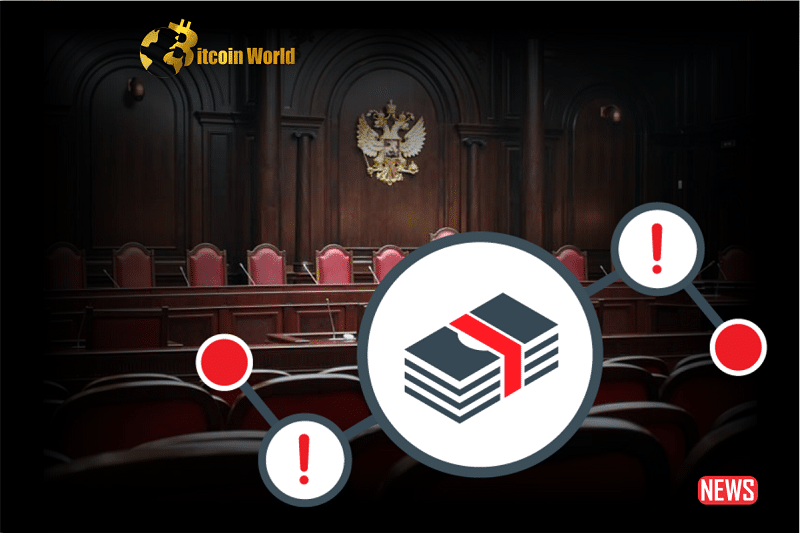In a move that’s sending ripples through the cryptocurrency world, Russia’s Supreme Court has made a significant decision: converting Bitcoin (BTC) obtained through criminal activity into traditional fiat currency is now officially considered money laundering. This landmark ruling, stemming from a case involving a drug dealer accepting Bitcoin, could reshape the landscape of crypto-related legal battles in the country. Let’s dive into what this means and why it matters.
Why is This Ruling a Game Changer for Crypto in Russia?
Previously, there was ambiguity surrounding the legal status of converting cryptocurrency into fiat currency when linked to criminal proceeds. A lower court had even acquitted a defendant on money laundering charges, arguing that the converted fiat wasn’t subject to such charges until it entered general economic circulation. This raised a crucial question: where does the line get drawn?
Imagine this scenario: a cybercriminal demands Bitcoin as ransom. They then exchange that Bitcoin for rubles. Under the previous interpretation, it could be argued that the act of conversion itself wasn’t money laundering. The Supreme Court’s intervention has now clarified this grey area.
The Supreme Court Steps In: A Shift in Interpretation
The prosecution, disagreeing with the lower court’s decision, took the case to the High Court, which initially sided with the lower ruling. However, the Supreme Court saw things differently. They interpreted the relevant section of Russia’s Criminal Code more broadly, stating that it encompasses all financial transactions involving the proceeds of crime. This means the act of converting illicitly obtained Bitcoin to rubles falls squarely under the definition of money laundering.
Here’s a breakdown of the key players and their stances:
| Entity | Initial Stance | Reasoning |
|---|---|---|
| Lower Court | Acquittal on money laundering | Fiat converted from Bitcoin isn’t subject to money laundering until it enters economic circulation. |
| High Court | Upheld the lower court’s ruling | Agreed with the narrow interpretation of money laundering. |
| Supreme Court | Bitcoin-to-fiat conversion is money laundering | The Criminal Code encompasses all financial transactions involving criminal proceeds. |
What are the Real-World Implications of This Decision?
This ruling isn’t just legal jargon; it has tangible consequences for how cryptocurrency-related crimes will be handled in Russia. Let’s explore the key implications:
- Easier Asset Seizure: The ruling provides a clear legal framework for authorities to seize and liquidate cryptocurrencies linked to criminal activities. No longer will there be a legal hurdle regarding the conversion stage. This means if a crime is committed and Bitcoin is involved, authorities can more easily confiscate those funds, even after they’ve been exchanged for fiat.
- Stricter Sentencing: With Bitcoin-to-fiat conversion now classified as money laundering, courts have the legal basis to impose harsher penalties in criminal cases involving cryptocurrency. This could act as a stronger deterrent against using crypto for illicit purposes.
- Precedent for Future Cases: This Supreme Court decision sets a significant legal precedent for all future cases involving cryptocurrency and criminal activity in Russia. Lower courts will now be bound by this interpretation.
- Increased Scrutiny of Crypto Transactions: This ruling signals a heightened focus on cryptocurrency transactions within Russia. Law enforcement agencies are likely to increase their monitoring and investigation of crypto flows, particularly those suspected of being linked to criminal activities.
A Recent Example: Treason Charges and Crypto Donations
The timing of this ruling is particularly interesting given recent events. A Russian citizen was recently arrested on treason charges for allegedly sending a cryptocurrency donation to the Ukrainian armed forces. While the specifics of that case are different, it highlights the growing intersection of cryptocurrency and legal scrutiny in Russia.
Challenges and Considerations
While this ruling provides clarity, it also brings potential challenges:
- Defining the ‘Proceeds of Crime’: Determining whether cryptocurrency was indeed obtained through illegal means can be complex and require sophisticated investigative techniques.
- Enforcement and Technology: Effectively tracking and seizing cryptocurrency requires specialized technological capabilities. Law enforcement agencies will need to invest in the necessary tools and training.
- Potential Impact on Legitimate Crypto Use: While aimed at combating criminal activity, it’s crucial to ensure that this ruling doesn’t inadvertently stifle legitimate uses of cryptocurrency within Russia.
Actionable Insights: What Does This Mean for You?
Whether you’re a crypto user in Russia or simply following global regulatory trends, here are some key takeaways:
- Increased Regulatory Scrutiny: Expect more stringent regulations and oversight of cryptocurrency in Russia.
- Importance of Compliance: If you’re involved in cryptocurrency transactions in Russia, understanding and adhering to legal requirements is now more critical than ever.
- Global Trend Towards Regulation: This ruling aligns with a broader global trend of governments seeking to regulate and understand the use of cryptocurrencies, particularly in relation to financial crime.
In Conclusion: A New Chapter for Crypto Legality in Russia
Russia’s Supreme Court’s decision to classify Bitcoin-to-fiat conversion by criminals as money laundering marks a pivotal moment in the country’s approach to cryptocurrency regulation. By expanding the scope of money laundering laws, this ruling empowers authorities to more effectively combat crypto-related crime through easier asset seizure and stricter sentencing. While challenges remain in implementation and potential impacts on legitimate crypto use, this landmark decision undeniably sets a new legal precedent and signals a more assertive stance towards regulating the intersection of cryptocurrency and criminal activity in Russia. The implications of this ruling will undoubtedly be watched closely by both the crypto community and legal experts worldwide.
Disclaimer: The information provided is not trading advice, Bitcoinworld.co.in holds no liability for any investments made based on the information provided on this page. We strongly recommend independent research and/or consultation with a qualified professional before making any investment decisions.


